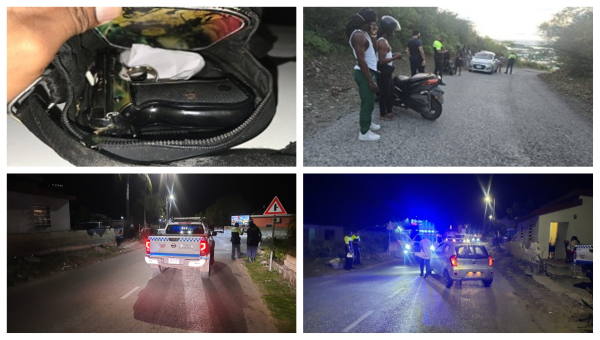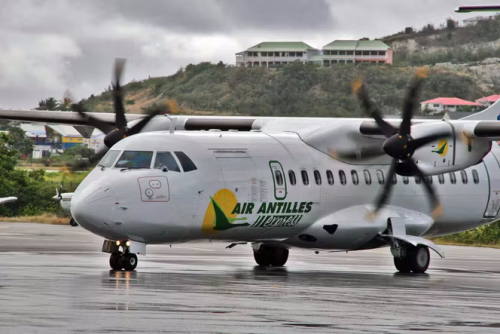 PHILIPSBURG:--- The Sint Maarten Police Force (KPSM) successfully executed a series of targeted enforcement operations across the island from Monday, January 12, through Sunday, January 18, 2026. The KPSM Team, working alongside the Uniformed Patrol Division (BPZ), deployed strategic controls at identified high-risk locations to combat criminal activity and restore order to our communities.
PHILIPSBURG:--- The Sint Maarten Police Force (KPSM) successfully executed a series of targeted enforcement operations across the island from Monday, January 12, through Sunday, January 18, 2026. The KPSM Team, working alongside the Uniformed Patrol Division (BPZ), deployed strategic controls at identified high-risk locations to combat criminal activity and restore order to our communities.
During these operations, officers took four individuals into custody for various criminal offenses:
- Stolen Vehicle Recovery (Arlet Peterson Road): A suspect was apprehended during a traffic stop while operating a stolen white Kia Picanto. Additionally, several scooters were impounded for traffic violations, including a lack of proper documentation (license, insurance, registration, road tax) and failure to wear helmets.
- Shooting Investigation (Armed Suspect Arrested): A suspect linked to a shooting incident was arrested. A subsequent search of the individual's residence yielded two air rifles, one paintball gun, and a shotgun cartridge.
- Illegal Weapon Possession (Carolita Road): During a routine traffic control, officers arrested a male suspect for carrying a concealed alarm pistol in a waist bag.
- Drug Possession and Assault on Officers (Kimsha Strip): A suspect was arrested for possession of narcotics, verbal assault on officers, refusal to obey lawful orders, and violent resistance. The arrest occurred in a challenging environment where the suspect became combative in the presence of a hostile crowd.
KPSM officers also executed high-visibility operations at known hotspots, including the Petro Plus Gas Station. The location was secured, and all persons on-site were subject to preventive searches. Officers addressed dangerous and unlawful behaviors, including smoking near fuel pumps, public disturbances, and excessive noise violations.
Weekly Enforcement Summary
- 160 vehicles stopped
- 45 vehicles searched
- 180 individuals frisked
- 4 arrests made
- 4 scooters impounded
- Multiple targeted controls executed at crime hotspots
KPSM remains steadfast in its commitment to enforcement operations across all districts of Sint Maarten. These actions are vital for public safety and will continue until order is fully restored and criminal behavior is eliminated.
KPSM reminds the public that any disruption of public order, threats against officers, or violence toward law enforcement will be met with immediate and decisive action. Disrespect and non-compliance will not be tolerated.
The Sint Maarten Police Force calls on every resident to help make the island safer. We urge you to report suspicious activity, comply with lawful orders, and support your police force.
 GUADELOUPE/ SAINT MARTIN:--- Air Antilles, a prominent airline serving the Caribbean, is facing a critical financial crisis that has brought its operations to a standstill. With its fleet grounded for over a month and cash reserves rapidly depleting, the company has turned to the Tribunal of Commerce in Pointe-à-Pitre for a lifeline. A decisive hearing is scheduled for Thursday, January 22, 2026, which will determine the airline's future.
GUADELOUPE/ SAINT MARTIN:--- Air Antilles, a prominent airline serving the Caribbean, is facing a critical financial crisis that has brought its operations to a standstill. With its fleet grounded for over a month and cash reserves rapidly depleting, the company has turned to the Tribunal of Commerce in Pointe-à-Pitre for a lifeline. A decisive hearing is scheduled for Thursday, January 22, 2026, which will determine the airline's future. PHILIPSBURG:--- Member of Parliament Egbert J. Doran is raising concerns over what he describes as a lack of communication from Minister of ECYS, Melissa Gumbs, regarding the future of the Sister Marie Laurence School.
PHILIPSBURG:--- Member of Parliament Egbert J. Doran is raising concerns over what he describes as a lack of communication from Minister of ECYS, Melissa Gumbs, regarding the future of the Sister Marie Laurence School. PHILIPSBURG:--- Corporate sponsorship for Contestant #3, Breyenne Brown, is off to a strong and promising start as she prepares for the Senior Carnival Queen Show 2026, scheduled for April 20th at the Jocelyn Arndell Festival Village, during Carnival’s landmark 55th edition.
PHILIPSBURG:--- Corporate sponsorship for Contestant #3, Breyenne Brown, is off to a strong and promising start as she prepares for the Senior Carnival Queen Show 2026, scheduled for April 20th at the Jocelyn Arndell Festival Village, during Carnival’s landmark 55th edition. PHILIPSBURG:--- The Where Culture Lives project has successfully completed its survey phase across Aruba, Bonaire, Curaçao, Saba, St. Eustatius, and St. Maarten. The project team extends sincere appreciation to the public who participated, and in particular to the island coordinators and surveyors whose dedication ensured strong community engagement across all six islands.
PHILIPSBURG:--- The Where Culture Lives project has successfully completed its survey phase across Aruba, Bonaire, Curaçao, Saba, St. Eustatius, and St. Maarten. The project team extends sincere appreciation to the public who participated, and in particular to the island coordinators and surveyors whose dedication ensured strong community engagement across all six islands.